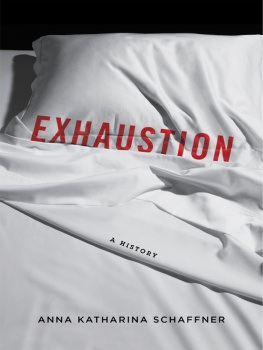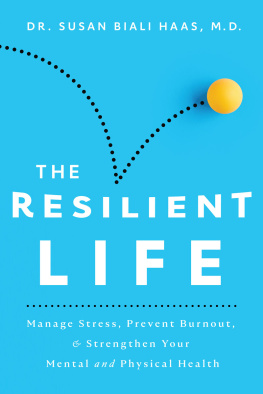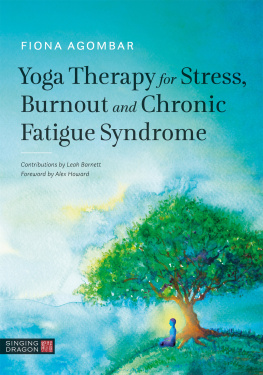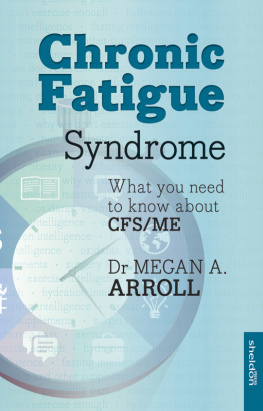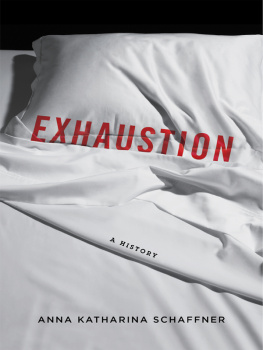Table of Contents
EXHAUSTION
EXHAUSTION
A History
Anna Katharina Schaffner
Columbia University Press New York
Columbia University Press
Publishers Since 1893
New York Chichester, West Sussex
cup.columbia.edu
Copyright 2016 Columbia University Press
All rights reserved
E-ISBN 978-0-231-53885-5
Library of Congress Cataloging-in-Publication Data
Schaffner, Anna Katharina.
Exhaustion : a history / Anna Katharina Schaffner.
pages cm
Includes bibliographical references and index.
ISBN 978-0-231-17230-1 (cloth : alk. paper)
ISBN 978-0-231-53885-5 (e-book)
1. Fatigue. 2. Social history. I. Title.
BF482.S33 2016
152.1886dc23
2015034503
A Columbia University Press E-book.
CUP would be pleased to hear about your reading experience with this e-book at .
COVER DESIGN: Julia Kushnirsky
COVER IMAGE: Monica Rodriques/Getty
We think of our own crisis as pre-eminent, more worrying, more interesting than other crises. It is commonplace to talk about our historical situation as uniquely terrible and in a way privileged, a cardinal point in time. But can it really be so? It seems doubtful that our crisisis one of the important differences between us and our predecessors. Many of them felt as we do. If the evidence looks good to us, so it did to them.
Frank Kermode, The Sense of an Ending:
Studies in the History of Fiction
CONTENTS
I would like to thank the following friends and colleagues for their help in shaping this book at various stages in its development: Tim Binding, Peter Buse, Felicity Callard, Francesco Capello, Andreas Corcoran, David Corfield, Mary Cosgrove, Chris Dooks, Laurence Goldstein, Michael Greaney, Claudia Hammond, Katja Haustein, Ben Hutchinson, Annette Kern-Sthler, Jenny Laws, Gordon Lynch, Ayesha Nanthoo, Caitrona N Dhill, Patricia Novillo-Corvaln, Anita OBrien, Karla Pollmann, Ernst and Eva Schaffner, Wilmar Schaufeli, Natalia Sobrevilla Perea, Axel Sthler, Nuria Triana-Toribio, Verena Trusch, William Viney, Greta Wagner, Simon Wessely, Laura Williams, and Angela Woods.
Thanks are also due to the Wellcome Trust for funding a conference on exhaustion at the University of Kent.
Finally, I would like to thank my editor at Columbia University Press, Jennifer Perillo, for her belief in the project and for her invaluable feedback, as well as Shane Weller, as always, for everything.
On a wintry afternoon in February, an old man steps out onto a balcony. There are no clouds in the sky, but a chilly wind is blowing. The old man shivers and wraps his garments more tightly around his frail, delicate body. His hair is as white as his robes. His face is a landscape marked by toil and sorrow, and the dark shadows under his watery eyes are an unhealthy shade of purple. His head is bowed so deeply that his neck almost forms a right angle with his hunched back, and his hands are trembling. He tugs at the heavy golden ornament that hangs around his neck.
The moment he steps out onto the balcony, the chatter in the square below him dies down, to be replaced by an expectant hush. It costs the old man all his energy to perform the next task. He clears his throat and, slowly, like an ancient turtle, raises his head. He spreads his arms and blesses the crowd. Then, in a grating, broken voice, he begins to say his farewells.
The figure is not any old man. It is Pope Benedict XVI, who announced his retirement to an astonished world on February 11, 2013, in a statement composed in Latin, read at a gathering originally convened to consolidate the canonization of three new Catholic martyrs. He reported both physical and spiritual exhaustion and offered his advanced age and deteriorating physical strength as the primary reasons for his decision to retire. He spoke of the burden of an office that had become too heavy for him; he said that the world was changing and was doing so at a pace with which he could not keep up. The ship of believers, he concluded, needed a helmsman stronger than he, someone capable of steering it safely through the choppy waters of our age.
A few weeks later, on February 28, 2013, a helicopter whisked the pope away from the Vatican to Castel Gandolfo, the palace where pontiffs traditionally rest during the summer months. Later that day, from the palace balcony, he addressed a crowd of pilgrims and well-wishers for the very last time, thanking them for their sympathy. In April 2013, he retired to a monastery in the Vatican Gardens, where, he said, he hoped to spend his remaining days in peaceful seclusion, praying, meditating, and once again dedicating himself to his long-abandoned and much-loved piano playing. On his first day in retirement, the pope emeritus watched recordings of his own farewell ceremony on television.
On only one previous occasion in the history of the Catholic Church had a pope resigned voluntarily: the year was 1294, and the pope in question was Celestine V (formerly the hermit Pietro del Murrone), who had been in office for only five months. Like Benedict XVI so many centuries later, he cited exhaustion as the primary cause for his wish to retire: Owing to the weakness of my body, in fact the weakness of my entire person, I hereby resign from the glory and the honors of the papal office, he declared.
There is something decidedly unsettling about the fact that the most iconic and symbolically important spiritual figure of the Western worldtraditionally a beacon of unwavering faith and indefatigable service unto deathshould have decided to hang up his papal mantle and to play the piano instead. Moreover, the former popes resignation aptly illustrates the all-pervasive sway that the experience of exhaustionboth physical and spiritualholds over our age. It certainly feels as though ours is the age of exhaustion, an age characterized above all by weariness, disillusionment, and burnout. A particularly virulent form of cultural pessimism, it seems, has come to dominate our discussions of politics, economics, ecology, and health care. The much-debated death of so-called grand narratives, and in particular the demise of political idealism that followed the collapse of the last Communist regimes in Europe, as well as the sad aftermath of the Arab Spring, have ushered in a new wave of political apathy, fed further by the ascendancy of opportunist party politics that have nothing to offer but the tired old mantra of economic growth.
Although there no longer appears to be a viable political alternative, the demise of capitalism has been proclaimed repeatedly after a recent succession of banking crises that are unprecedented in their severity and scalebut even these apocalyptic verdicts themselves appear weary and lackluster, as though they, too, were merely another symptom of our burned-out age.
In addition to the doubts about the sustainability of our current economic system, the very sustainability of our ecosystem continues to be called into question, the scientific evidence becoming ever stronger. The land, sea, and sky are being irreparably damaged by our careless habits of consumption.
While not synonymous with exhaustion, all these syndromes include the core symptoms of physical and mental exhaustion.
There is no doubt that the specter of exhaustion shapes both public debates and lived experience in the early twenty-first century, chiming eerily with our weary zeitgeist. Is not ours the most exhausted age in history? And does the current epidemic of exhaustion not threaten the very future of the human animal? There are many who believe this to be the case. Yet before simply assenting to this assessment of our times, there is another question that needs to be asked: What do we really mean when we speak of exhaustion? In spite of the ubiquity and the metaphorical potency of the term, and its many applications in medical, psychological, economic, and political debates, exhaustion is a slippery concept, one that borders on, and often overlaps with, various others. How can we define exhaustion, and how can we demarcate it from related ideas and diagnoses? Is exhaustion a state that we can quantify scientifically, or is it a wholly subjective experience? Is it primarily a physical or a mental condition? Is it predominantly an individual or a wider sociocultural experience? Is it really the bane of our age, something that is intimately bound up with modernity and its discontents, or have other historical periods also seen themselves as the most exhausted?



